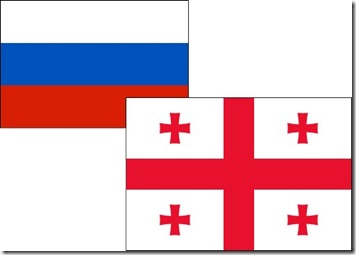Knock, Knock. Who's there? Russia. Russia who? Russia's back and you better take notice!
Cheesy? Maybe. But purely for illustrative purposes. All of a sudden the tiny Caucus state of Georgia (no, not the one known for peaches and freaknik) has been all the rage in Western media outlets. So what's this about? Who wants what? And why?
The conflict in Georgia is Russia's largest military engagement outside its borders since the collapse of the Soviet Union in 1991. Here are some of the key issues in the current crisis.
Who is fighting whom?
On one side is Russian air, naval and ground power. On the other is the military of Georgia, a small, separate country south of Russia on the eastern shore of the Black Sea. It was part of the Soviet Union but has a history of troubled relations with Moscow.
Where are they fighting?
The bulk of the fighting revolves around two pro-Russian enclaves, South Ossetia and Abkhazia. The fighting appears to be expanding toward other parts of Georgia. Russia captured a military base in western Georgia on Monday, and there were conflicting reports whether a main road had been cut near the city of Gori.
What is the background to the fighting?
Moscow has long viewed itself as the protector of the two enclaves, which have been under pressure from the central government in Georgia.
In 1990, Georgia voted to abolish the autonomy of South Ossetia and by 1991 the ethnic antagonists were fighting. In 1992, Georgia and Russia signed a peace treaty and Russian troops began patrolling the South Ossetia border.
That same year, Abkhazia declared its independence from Georgia and another war was fought, which ended in 1994 with a treaty between Russia and Georgia. Russian troops then began patrolling that enclave too.
What touched off the latest fighting?
Georgia launched a surprise operation last week to seize control of South Ossetia. An enraged Russia sent its military into the breakaway republics and bombed Georgia proper.
Was this confrontation expected?
Yes and no.
Many western experts have predicted that Russia would stage some sort of military action after Mikheil Saakashvili was elected president of Georgia in 2004. As part of his platform, he said he wanted to reincorporate the enclaves into Georgia. Most experts agreed that Russia would respond with force if that happened.
Does the United States have any special interests in the area?
Saakashvili is an ally of the United States and sent troops to fight in Iraq and Afghanistan. The United States has strongly backed Georgia's effort to join NATO.
Russia fears that its former Soviet partners and satellites will look to Europe and form a pro-Western ring, curbing Moscow's arena of diplomatic action.
The second concern is energy. Georgia is a major conduit for oil flowing from Russia and Central Asia to the West.
What is the U.S. diplomatic position?
President Bush said Monday that the United States wants Russia to end its offensive and return to the situation that existed before the fighting began.
In a tough statement from the White House after he returned from the Olympics, Bush said: “Russia has invaded a sovereign neighboring state and threatens a democratic government elected by its people. Such an action is unacceptable in the 21st century.”
Bush said there were reports that Russian forces soon might begin bombing the civilian airport in Tbilisi, the Georgian capital. Such an action “would represent a dramatic and brutal escalation of the conflict in Georgia and these actions would be inconsistent with assurances we have received from Russia that its objectives were limited to restoring the status quo of South Ossetia that existed before fighting began.”
What's at stake?
Democracy, resources, and the geo-political re-balancing of the Middle East.
If Georgia falls to Russian aggression we will see a domino effect throughout the region, and the world. Other former ex-Soviet, pro-Western regimes will come under additional pressure from an increasingly bellicose Russian regime. Russia, which currently is the worlds number one producer of crude oil, will control the Baku-Tbilisi-Ceyan pipeline, a pipeline that Europe is highly dependent on. Currently Europe is dependent on Russia for 40-80 percent of their energy consumption. Control of this crucial pipeline (responsible for more than 2 percent of world oil output) will make Europe wholly dependent on Russia for it's energy needs (Think US:M.E. Oil).
With oil prices sure to stay between the $80-150 range for the foreseeable future, control of this pipeline will translate to increased State revenues. Increased State revenue translates to increased investment in social services and infrastructure projects - sure to keep the population happy as Putin & Co. go on with their grand plan of re-unifying the Soviet Union. The increased revenue will also lead to increased arms production - these arms are almost certain to end up in States who, let's just say, are not on our Christmas card list. The steady flow of Russian arms to China, and more importantly Syria, Lebanon, and Iran will lead to a re-balancing of the geopolitical pendulum in the Middle East. This in turn hampers any attempt at truly stabilizing Iraq, and further complicates any prospect of concluding the Israeli-Palestinian conflict.
Welcome to the 21st Century: a Cold War, Islamic Extremism and Nuclear Weapons, all wrapped into one.
So yes, you should care about what's going on in Georgia.

No comments:
Post a Comment